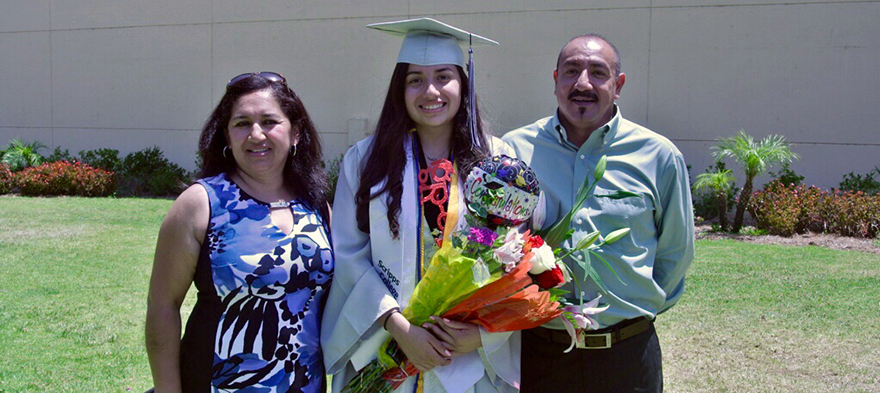
I am the Latina daughter of two immigrants. My parents instilled in me from an early age that education was important. When I got older, I realized that a college education would be essential to any dream. I grew up in a community where affordable quality health care was not an option. I witnessed medical providers give subpar medical care to those I love. My passion for medicine combined with my lived experiences inspired me to become a doctor and serve low-income, Spanish-speaking communities.
So I studied hard, pushing myself to succeed in the AP and honors classes that my teachers recommended and that prestigious colleges required. I was heavily involved in extracurriculars, participating on my school’s soccer, cross-country and basketball teams while also becoming president of our National Honor Society chapter. I stayed up late working on college applications, writing and refining my statement and working to complete the FAFSA.
I worked hard, and in the end, it paid off. I got accepted to Williams College with a scholarship that covered 98 percent of my tuition. And my experience on campus was life-changing. I won a national fellowship that funded two years of faculty-mentored research and I’m currently studying to take the MCAT.
However, last month, the nation’s largest admissions scandal was a frustrating reminder that the college admissions system is far from the meritocracy it should be. I’m frustrated that a few extremely wealthy celebrities and individuals were willing to cheat and bribe their children’s way into college. And [pullquote]I’m frustrated that the college admissions system is inherently set up to benefit those from means.[/pullquote]
But it isn’t just money that is the cause of the economic and racial disparities we see in college admissions. There’s another component in successfully navigating the path to college: whether someone in your family has done it before.
For students from these families, college is an expectation. They have someone to show them the path to an acceptance letter. Without a mentor during the process, it is difficult to know what hoops you need to jump through. You don’t even know what the hoops are. But luckily, this college-ready culture is something that we can bring to first-generation students who don’t have a college-background in their family. I’m an example of it.
I attended Alliance Marc & Eva Stern Math and Science School, or Stern MASS, a charter high school in the University Hills neighborhood of Los Angeles. When most students come to Stern MASS, they are four grade levels behind. Across the network of Alliance schools, 85% of students are the first in their family to attend college and 17% are English language learners, making college seem more like a dream than an option. However, it’s clear from day one that the teachers and staff are committed to getting each student college-ready.
Our classes were small, meaning I got the personal attention I needed to succeed in AP and honors courses. And if I needed extra help outside of class, all Stern MASS teachers host office hours after school for homework help, tutoring or whatever else I might need.
As freshmen, I was placed in a 45-minute advisory class led by a teacher who I had for all four years of high school. It was in these classes that the college admissions process was demystified. Spending those years together, my teacher learned about my goals and dreams after high school, and we developed a deep trust of each other. We discussed what colleges would be within my reach, match and safety schools, what test scores I would need and how many years of math, science, and English I should take.
But more importantly, when I began to doubt myself and wonder if I was dreaming too big, my teachers at Stern MASS were there to remind me that I was on the right path and that college was going to be a reality. [pullquote]They helped me find my confidence and realize that I was qualified, intelligent and would belong and thrive at a prestigious liberal arts school.[/pullquote]
This is why it's hard to hear about the anti-charter legislation moving forward in California’s state capitol. Charter schools like Stern MASS serve low-income students of color—communities who often can’t afford the private schools, SAT tutors and college coaches that help so many other students get into prestigious colleges.
California needs access to high-quality public charter schools so that every child, regardless of zip code or background, can attend a school that offers the time and personal attention they need to truly learn and succeed. Let’s make sure all students have access to educational options that make the pathway to college possible.
Karen Linares is a 2014 graduate of Alliance Marc & Eva Stern Math and Science School and a 2019 graduate of Williams College.
If you have a child with disabilities, you’re not alone: According to the latest data, over 7 million American schoolchildren — 14% of all students ages 3-21 — are classified as eligible for special...
The fight for educational equity has never been just about schools. The real North Star for this work is providing opportunities for each child to thrive into adulthood. This means that our advocacy...
The story you tell yourself about your own math ability tends to become true. This isn’t some Oprah aphorism about attracting what you want from the universe. Well, I guess it kind of is, but...
Your donations support the voices who challenge decision makers to provide the learning opportunities all children need to thrive.
Ed Post is the flagship website platform of brightbeam, a 501(c3) network of education activists and influencers demanding a better education and a brighter future for every child.
© 2020–2024 brightbeam. All rights reserved.